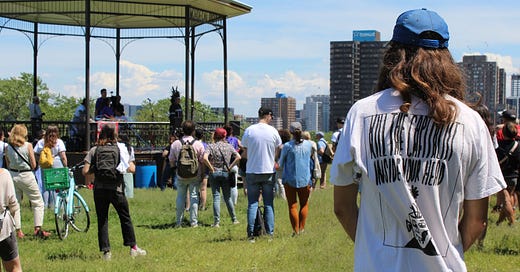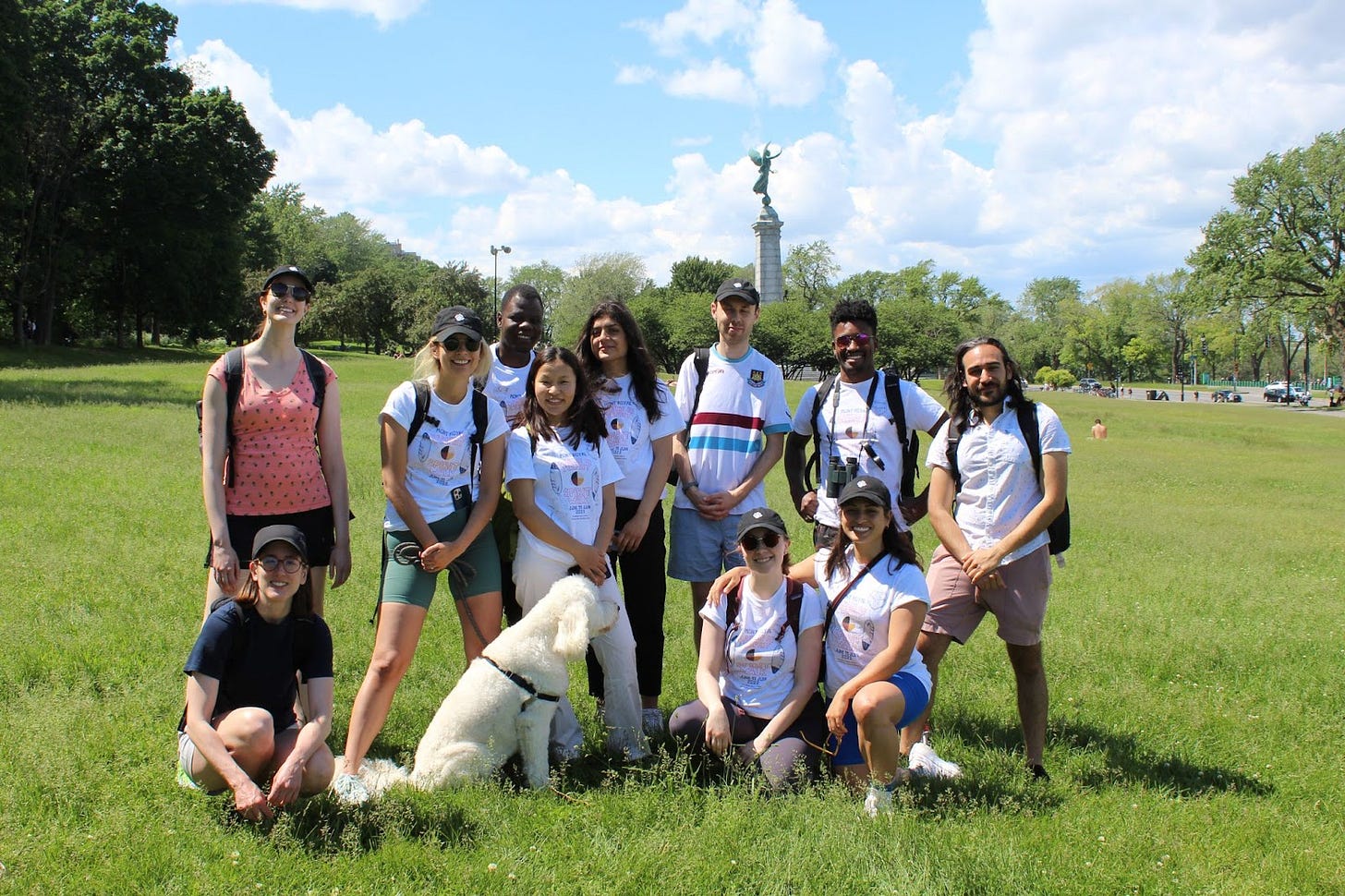Acting on Reconciliation: MPPs Walk in Support of the Native Women’s Shelter of Montreal
The Eighth Annual Spirit Walk organised by the Native Women's Shelter of Montreal raised over $65,000 for a new pediatric centre
Paola Salas Paredes is an MPP candidate at the Max Bell School of Public Policy. Originally from Panama and educated in the United States, Paola leverages her multicultural perspective to inform evidence-based policymaking. She is interested in the intersection of science, technology and democratic governance for addressing social inequality and tackling our greatest global challenges.
Phaedra de Saint-Rome is an MPP candidate at the Max Bell School of Public Policy where she is also co-editor of The Bell. She is a dual Finnish-Canadian and is interested in the challenges and opportunities of policymaking at the global level, with a particular focus on digital technologies and geopolitics, platform governance, and dis-information.
Spirit Walk attendees listen to Kahnawà:ke resident, Ahonwakerane Stacey, deliver opening remarks.
LAST SATURDAY, a group of Max Bell MPPs joined the Native Women’s Shelter of Montreal and its supporters at its annual Spirit Walk on Mount-Royal to raise funds for the Shelter’s second stage housing project, Miyoskamin House. This year’s walk specifically sought to raise money for development of the Saralikitaaq Social Pediatric Centre, an Indigenous-led space for families to access health and social services in a culturally safe environment.
With the commemoration of National Indigenous Peoples Day on June 21, a discussion is much needed about the importance and urgent necessity of a place like Saralikitaaq in Montreal.
Canadians are reckoning with the barbaric legacy of colonisation as a result of the ongoing discoveries of mass graves of children on the grounds of former residential schools. This legacy persists in public policy today in the form of policies like birth alerts and the foster care system, which disproportionately impact Indigenous women and children.
A birth alert is when a medical practitioner or social worker “flags an expectant parent to hospital staff without their consent, because they feel the parent may put their newborn at risk.” Last year, an APTN News investigation found that on average, “about 30 percent of birth alerts in the northwestern Quebec region of Abitibi-Témiscamingue are for Indigenous newborns, even though Indigenous people make up about four per cent of the region.” Equally disproportionate, according to Canadian federal census data from 2016, Indigenous children make up 7.7 percent of the population up to the age of 14, but account for over 50 percent of children in foster care.
More than that, Indigenous women experiencing homelessness run higher risks of violence and face more barriers to receiving public assistance. Because women’s homelessness is much less visible, it tends to be less of an issue for policy-makers, who typically focus on and respond to perceived problematic occupations of public space.
Nakuset, the Executive Director of the Native Women’s Shelter of Montreal, delivered remarks at the Spirit Walk, in which she stated, “[w]e’re tired of waiting for institutions to implement the recommendations from the [National Inquiry on Missing and Murdered Indigenous Women and Girls (MMIWG)]” – the report of which was tabled in 2019 and which echoed the calls to action in the 2015 Truth and Reconciliation Commission Report.
The situation facing Indigenous women in Quebec is built on a different political and socio-historical context from the broader Canadian one, in part because of the lack of legal treaties between the Crown and First Nations before the 1970s. In addition, the Church also managed healthcare and education in Quebec up until the 1960s, which meant that even though Quebec only officially opened its first residential school in 1931, Quebec’s clergy continued to manage them throughout the 1950s at a time when other schools across the country were being shut down.
The separate reality in Quebec led to a Quebec Report being published as a supplementary document to the 2019 MMIWG Report, intending to shed light on the different realities facing Inuit in Canada as well as Indigenous women broadly in Quebec.
This report noted that because of the more recent history of residential schools and Church involvement in education and healthcare in Quebec, that “at least two generations of First Nations in Quebec [who are still alive today] spent significant parts of their lives in Indian residential schools.” It also found that “up until the 1960s orphans, young offenders and children who were considered “illegitimate” were put in the care of religious congregations [whereas elsewhere] in Canada, child welfare has, for a long time, been under the responsibility of secular agencies mandated by the state, with a preference for placing children in foster homes or facilitating their adoption.”
In 2015, the TRC noted that Canada’s child-welfare system has simply continued the assimilation that the residential school system started. This is why we need community-led services like the Saralikitaaq Social Pediatric Centre.
Further, after a six-month investigation into the living conditions of Montreal’s Indigenous homeless population living in the Milton Parc area near McGill campus, the City of Montreal’s Ombudsperson, Nadine Mailloux, described the situation as “intolerable human distress.” She also flagged that, “[t]here are no resources in Montreal specifically dedicated to the Inuit community.”
There had been a plan previously to open a temporary home in Montreal's Villeray district for Inuit from the northern Quebec region of Nunavik who come to Montreal to receive healthcare services. However, the plan fell through in 2010 when someone distributed leaflets warning of “drug addicts” and “criminals” moving into the neighbourhood.
*
ON ANY GIVEN DAY, Max Bell MPPs bike through the intersection of Parc and Milton on their way to class. This intersection is known for the presence of people experiencing homelessness, the majority of whom are Indigenous. It is estimated that there are between 400 and 500 Indigenous people who experience homelessness in Montreal daily.
The stark reality of encountering a policy problem on her daily commute was not lost on MPP candidate Paola Salas Paredes. As the Public Policy Association of Graduate Students (PPAGS) VP of Social and Events, Paola wanted to contribute toward a solution to the issue of Indigenous homelessness in Montreal, so she looked for an opportunity to incorporate community service into the Max Bell experience; the Eighth Annual Spirit Walk fundraiser to benefit the Native Women’s Shelter of Montreal seemed like the perfect opportunity.
With one week until the Spirit Walk, PPAGS challenged MPPs to join the effort and fundraise. Within 48 hours, PPAGS had already met its initial goal of $1,000 in donations. By the time the Spirit Walk kicked off that Saturday, “PPAGS Max Bell School” was the team with the highest amount of donations, soliciting over $5,500.
It was an intentional event with land acknowledgements, Indigenous performances, prayer and blessings before the lively crowd took off on a 5k walk up Mount-Royal. At the end of the event, the organisers announced that the walk had drawn its largest turnout in its eight year history, and that fundraisers had surpassed the $60,000 goal. We sincerely thank everyone who contributed to this meaningful cause.
It was great to see the community rally around Indigenous women and children on this sunny summer Saturday, but the onus should not be on the engaged public to crowdsource public spending. The city’s elected officials should prioritise the lack of community services and shelter available to Indigenous people, particularly women and children, with the same fervour used to build bike lanes.
PPAGS Max Bell School Fundraising Team at the Spirit Walk 2022: Aiza Abid, Daniel Cruden, Tenzin Dasel, Elizabeth Fraser, Kerry & Cathy Kittson, Gardy Lavertu, Caroline Merner, Juma Omala, Clarissa Passos, Raul Scorza Figueroa, Paola Salas Paredes and Phaedra de Saint-Rome.
The Bell is edited by Jaclyn Victor, Jason Kreutz, Shweta Menon and Phaedra de Saint-Rome of the Max Bell School of Public Policy at McGill University.






